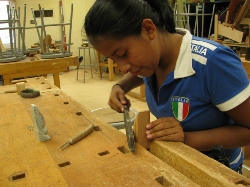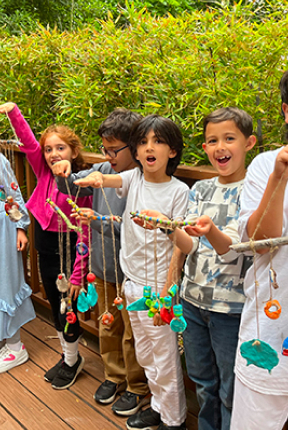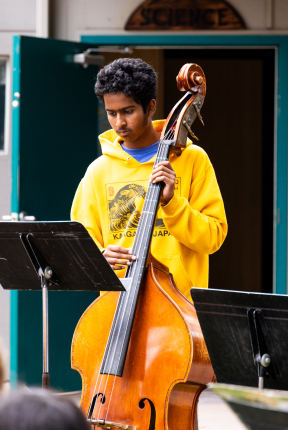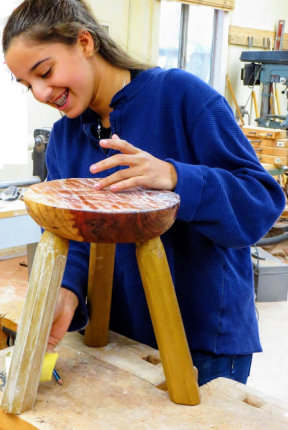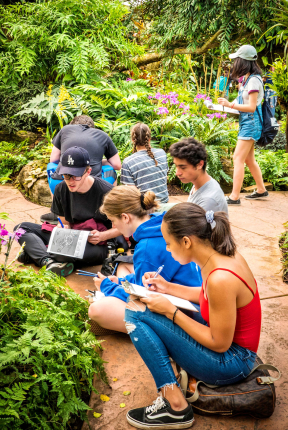A student’s perspective on discovering Waldorf education as a high school student. By Aaron Stemp, 11th grade.
“I once believed that public school was a necessary evil, or at least the lesser of two. I thought that private school was for kids with twice my ego and twice my parents’ income. But Waldorf school isn’t private school – not exactly. I’ve come to realize that compared with Waldorf, all other forms of education are, in a word, uninspired. When I first came upon Waldorf education, it was but one of a series of escape routes from the public school I so abhorred; a humble little alternative education school carved out of the hills of Northridge, and as far as I was concerned, the smaller and less traditional, the better. See, in my final days at a school of 2,500 kids, a terminal exhaustion preyed upon me. I was tired of the invariable polarity between the nonachievers and the overachievers. Tired of the massive weight of conformity all around me, weighing me down more than my 20-pound backpack. Tired of aimlessly wandering the campus, trying to remember every face that passed, though I knew I would never need to know them. Tired of days, weeks’ worth of school days spent without meaningful human contact, walking with ghastly accuracy the path I had yesterday, and the day before that, and the day before that. So, pursued by a looming mountain of work I had no motivation whatsoever to complete, I ran for the hills. Having done some reading up before hand, I approached the school with curiosity and healthy skepticism – this Steiner had some fine ideas about how education should occur, but reminded me unfavorably of Robert Owen, who founded the first kindergarten (and cofounded socialism). However, upon my arrival, I began to feel, as best as I can describe it, a spirit of goodwill about the place. This only increased the more I saw of the place, thinking what a beautiful place to grow up in this was, and the more people I met who greeted me with almost heavenly hospitality. I was not as attracted to this as I should have been, as surrounded by this atmosphere of joy, the resentment that had grown in me previously as I listened to the druggies at the back of the bus describe their latest debauchery felt dark and isolated within me (as though I, mortal and sinner, had intruded upon Eden).
“We – my mom and dad and I – were led into a beautifully furnished kindergarten classroom filled with several young couples who as far as I knew had not conceived yet. Does anyone else simply seek high school education here? I wondered. Does anyone live and learn here not having had the advantage of coming here all their lives to date? The presentation itself was mildly interesting, though I recognized some of it as a sales pitch appealing to the overly spiritual; I noted that freedom and imagination were emphasized at the point where in most children’s lives, a long period of boredom, exasperation, and eventually indignation begins. Nonetheless, I was eager to see Steiner’s theories speak for themselves. As we first observed a middle school math class, I noted almost instantly that neither the teacher nor the students seemed anything less than elated to be where they were, doing what they were doing. They were not in conflict, but cooperating less like they had on mutually dissatisfying business agreement, more like friends who just happened to work with each other, and have a ton of fun doing it. But since kids are most often energetic and adorable and I knew from my previous experience that even the brightest child could be eclipsed by adolescence, I kept both hope and skepticism well in mind as we crossed campus to preside over German. What I saw there blew my highest expectations out of the water. Student after student would stand in front of the blackboard and enthusiastically, without hesitation, monologue in words which sounded foreign and eloquent to my uncomprehending ear. Whenever one of them made some grammatical error, a fellow student would correct them, and take their place at the helm of the great demonstration.
“It was like educational clockwork – I understood we were meant to be invisible spectators there, and that’s certainly the way it seemed, though the impression I took away was that they were all too avid with their presentation, or focused on the presentation of another, to take any notice of us. The next class we visited was senior calculus, in which I could hardly expect to find such a fervent crowd, but if they were less energetic, they were all as intent on the material being taught as the token student in a class at my last school who’d actually come to learn. Lastly there was handbell choir, to which the other visitors and I were an audience for two if not three impeccable pieces played in tones I had never before heard produced by an orchestra of any kind. Heavenly chimes, or so they sounded, and my dark side further writhed within me. That music, along with all I had seen there, haunted me all the way home. Although it was originally meant to be only one of several such visits to other schools, I was sold; while I recognized that another private school might by luck of the draw attain the excellence I had seen, I knew none could surpass it.
“During my shadowing and later visits, I found to my surprise that I enjoyed all my classes – even had the teachers not been such delightfully diverse characters as to attract my attention regardless, the dynamic of little jokes passed between my fellow students and from student to teacher kept me thoroughly entertained all the while. Sitting in a room for 45 minutes or even an hour and a half was pleasant in good company, it seemed. My classmates were far friendlier than they had ever been at my public school, and through talking with them I learned that here, the Waldorf lifestyle was more a scary story (No media? God forbid!) than requirement. And as I returned home, I discovered what was an entirely new experience for me. Was it possible that I could feel better about my life following a day at school? I came to like this school better and better, and frankly, it was rejuvenating my faith in humanity. Hence, I did all I could to insert myself into the near utopia of Highland Hall. Later, as I listened to the long-time Waldorf students around me describe their brief forays into public school and mainstream private school, all I could think was “why in God’s name would you ever leave this place?” But I knew, more or less. They were led away by the same principle which led me here – the grass always looks greener on the other side of the fence. Which may or may not be true, but one thing is certain – grass grows greener where it is tended with care.”
September 2014
